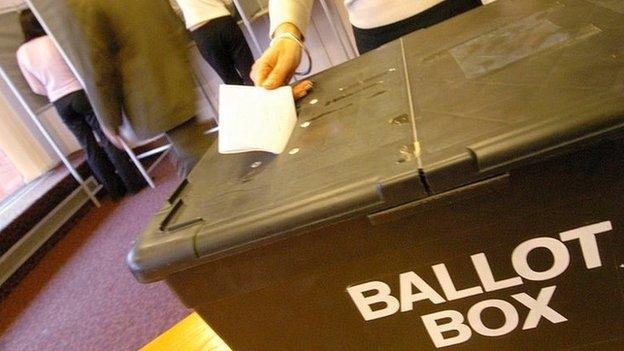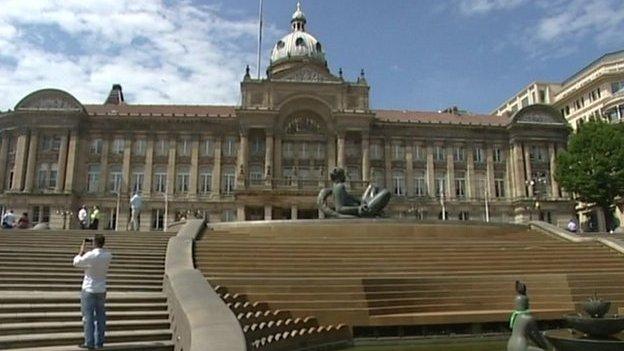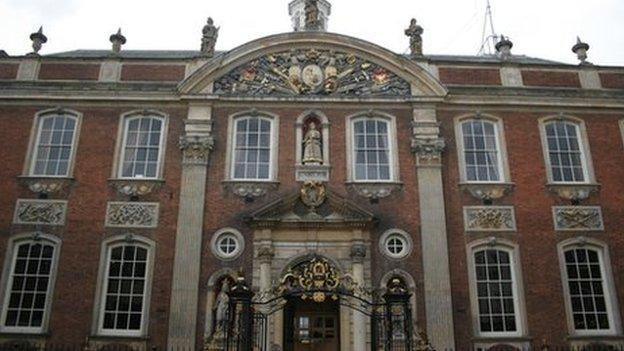Midlands councils point towards the general election
- Published
- comments

It's all taking place on 22 May
Why, when and where?
Q: Why aren't we having our local elections as usual on the first Thursday in May?
A: It's hoped that by synchronising them with the European Elections, money will be saved and turnouts raised.
Q: What's so special about 22nd May?
A: It's a Thursday!
While there's nothing sacrosanct about Thursdays, it is a convention in this country that it is when elections are held. One theory is that it was originally the day generally considered least disruptive to government and council business. The composition of the elected body would usually be known by the Friday, leaving the weekend for the formation of a new administration in time for the start of the working week. In this case, it's the Thursday closest to the Sunday when voters go to the polls in the rest of Europe: the results will not be declared until after polls have closed across the EU on Sunday night: it would never do for the West Midlands results to skew the outcome in Westphalia, would it??!!
Q: Where exactly is polling taking place.
In addition to the vote every elector has in the European elections, there will be local elections in all seven giant metropolitan authorities in the West Midlands conurbation from Coventry to Wolverhampton. Then there are the 11 county districts where most will elect one-third of their councillors. But in Nuneaton and Bedworth and in Cheltenham half the seats are to be contested.
With nearly 350 seats in play in 18 councils, this is a very big electoral deal in its own right. But that will not stop us from scouring the results for pointers towards the next general election.
This is inevitable with less than twelve months to go, especially here in a region where nearly 30 of our famous 'marginal' seats feature in the rival target lists for the two biggest parties: with both the Conservatives and Labour short of a Parliamentary majority, each needs gains from the other.
And by an uncanny quirk of fate, two-thirds of those 18 councils holding elections also feature in the roll call of Parliamentary marginals.
1. BIRMINGHAM

Labour will retain control but could also gain ground.
At the UK's largest local authority, Labour will retain control. But voting will be keenly watched to see if Labour can gain ground, in Edgbaston for example, which is always a key Parliamentary marginal. The Conservatives will hope to keep what they hold in Northfield and Bournville which will be general election target territory for them next May. The Liberal Democrats will be battling to hold off Labour in key wards including those in the Lib Dem's Parliamentary constituency of Yardley.
2. CANNOCK CHASE
Labour currently hold 24 of the 41 seats and will be defending just 5 of the 13 wards going to the polls this time so they will be hoping to increase their majority. The council area exactly matches the Parliamentary constituency which Aidan Burley captured so sensationally for the Conservatives with a 14% swing. He announced in February that he would stand down at the next election following his involvement in a Nazi-themed stag party. This is one of the areas where UKIP polled strongly in last year's county council elections.
3. CHELTENHAM
The Regency spa town has had a Liberal Democrat MP for more than twenty years. It is also the only Liberal Democrat-controlled authority in our part of the country. Their ruling group's obituary has been written many times before and it does have twice as many seats as the Conservatives. But with Nick Clegg's party languishing in the polls this will be an important test of the Lib Dems' ability to retain traditional core support.
4. COVENTRY
Labour will retain or even strengthen its comfortable majority. With no Liberal Democrats in the current council, attention will focus on UKIP's claims it is gaining support at Labour's expense and not just that of the Conservatives.
5. DUDLEY
Having gained overall control in 2012 Labour defend 12 of its 42 seats this time, so it will hope to strengthen its position especially against a Conservative group afflicted by internal disputes and defections, especially to UKIP. Also on the council is Will Duckworth, the national Deputy Leader of the Green Party. Voting patterns will be closely scrutinised for pointers to the two Parliamentary marginals: Dudley North has a wafer-thin Labour majority and Dudley South is also a weather vane seat currently held by the Conservatives.
6. GLOUCESTER
The Conservatives have 18 seats and Labour and the Liberal Democrats nine each. So the Conservatives look set to remain the largest party, but voting patterns will be closely scrutinised not just for UKIP's showing but also in terms of the city's barometer Parliamentary constituency. The Conservatives gained it from Labour at the last general election with a majority of under 2,500.
7. NEWCASTLE-UNDER-LYME
Having deposed the Conservative-Liberal Democrat coalition last year, Labour have a majority of four. Most of its seats happen to be among its safest. This is one of the places to look at for evidence of the UKIP challenge: the council leader here failed in his bid for a county council seat last year, losing to an incumbent UKIP councillor by just two votes. Labour have a Parliamentary majority here of just 1500.
8. NUNEATON AND BEDWORTH
Labour won a majority last time and now have three times as many councillors as the Conservatives. Nuneaton's constituency has a Conservative majority of just over 2,000.
9. REDDITCH
A see-saw council in a marginal Parliamentary constituency. Labour took back control from the Conservatives two years ago and currently hold 15 seats to the Conservatives' 13 with one independent. The Parliamentary seat is held by the Conservatives with the 6,000 it achieved in defeating the former Home Secretary Jacqui Smith at the last general election.
10. RUGBY
The Conservatives go into this election holding 25 seats to Labour's 10, the Liberal Democrats' 6 plus one independent. The Conservatives also won by-elections in May and November last year and have a Parliamentary majority of 6,000.
11. SANDWELL
Labour enjoyed a clean sweep here in the last elections two years ago although three former councillors now sit as independents. One of only two remaining Conservatives is up for re-election.
12. SOLIHULL
An intriguing contest: the Conservatives hold 28 of the 51 seats with a majority of five. But with five different parties contesting this election, the Conservatives need only to avoid a net loss of two seats to retain power. This is the Green party's strongest area in the West Midlands and with only one of its seven seats up for election it is hoping it could become the official opposition. The Liberal Democrats' performance will be a key factor in a Parliamentary constituency where it had a majority over the Conservatives last time of just 175.
13. STRATFORD-ON-AVON
A Conservative stronghold. It has 30 seats to the Liberal Democrats' 14 and Labour's one. But the headline numbers belie the catalogue of internal strife and defections, one way and another, which lies beneath. Since the last elections, three Conservatives have become independents and two Liberal Democrats have switched to the Conservatives. The election of a Labour councillor last year is said to have surprised the party.
14. TAMWORTH
Labour will be fighting hard to gain the three seats it needs to end ten years of Conservative rule in the home of Sir Robert Peel, father of modern-day Toryism. Labour will be defending only three of the 12 seats it holds, having gained five in 2012. As in Cannock, UKIP polled strongly here in last year's county council elections in a Parliamentary seat where the Conservatives currently have a 6,000 majority.
15. WALSALL
A knife-edge contest will be scrutinised for general election pointers where both Parliamentary seats are on the Conservatives' target list. But Labour need a net gain of just three seats to depose the Conservative-Liberal Democrat administration and take power for the first time since 2000. The Conservatives currently hold 25 seats, their Liberal Democrat partners, five and Labour 28. One possibility is that independent councillors may hold the balance of power. UKIP, too, could make an impact: it polled more than 10% in each of the 8 wards contested in 2012.
16. WOLVERHAMPTON
With 44 of the council's 60 seats, Labour has a comfortable majority but drastic budgets cuts are seeing the administration cutting 20% of their workforce over the coming year. Who takes the blame, the council or the government? One of the city's three Parliamentary seats, Wolverhampton South West, is a Conservative marginal with a majority of under 700.

High drama at The Guildhall in Worcester? Twelve seats are up for grabs
17. WORCESTER
'The Faithful City' has seen some high drama since its last elections two years ago which left the Conservatives and Labour tied on 16 seats each. The Conservatives formed an administration with Liberal Democrat support. But when one Conservative defected to Labour and the Liberal Democrats switched allegiances, Labour were able to replace the Conservatives with a minority administration of their own. This time the Conservatives have two key target seats, including the ward currently held by the Con-Lab defector. If the Conservatives were to capture either or both targets and retain the five it is defending it would return to power: a high-octane contest in a key marginal Parliamentary seat where the Conservatives currently have a majority of under 3,000.
18. WYRE FOREST
More than a decade after 'People Power' carried all before it by taking control of the council and getting the Independent MP Richard Taylor elected for an unprecedented two terms at Westminster. Health Concern currently hold nine seats, one more than Labour, so a key contest will be the battle for second place. The Conservatives, with 19 seats, currently have a minority administration. But the Liberal Democrats, thanks to a combination of defeats and defections currently have no seats at all. Here at least, they have been outlived by the Liberal Party: the un-de-merged Liberal Party of Lloyd George and Jo Grimmond will be defending one of their three seats.
If you are still with me, you will have seen by now why we are always so keen to take stock of elections like these, especially with less than a year to go to the main event.
They are serious tests of opinion in a part of the country which is always one of the most important general election battlefields.
Equally, you will have gathered by now that there with so many local quirks and sub plots, every local council election has a tale to tell that is all its own. (Just look again at Wyre Forest)
A reminder, if ever we needed one, that there are limits to how far we should go in interpreting the bigger electoral picture. This really is chiefly about electing councillors after all!